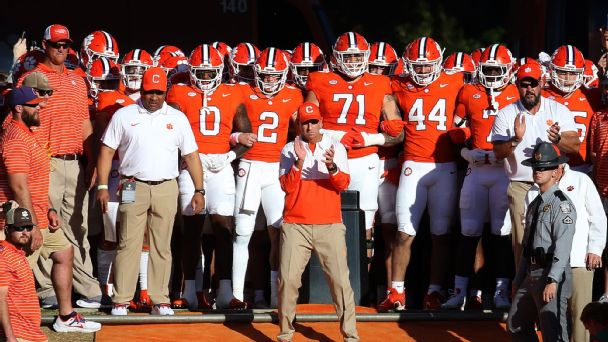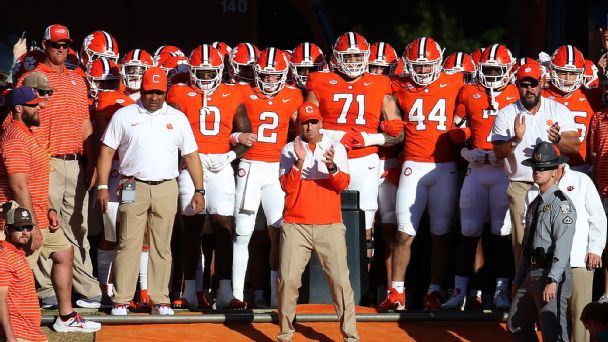
Clemson became the second school to sue the ACC in state court in an effort to extricate itself from onerous exit fees and a grant of rights that runs for another 12 years.
The lawsuit, filed in Pickens County, South Carolina, on Tuesday, follows a similar blueprint to the one filed by Florida State in Tallahassee in December. Both aim to challenge the veracity of the league’s grant of rights, while the ACC’s countersuit in North Carolina looks to uphold the agreement.
So, what does Clemson’s latest legal maneuver mean for the ACC and the future of realignment? ESPN answered some of the key questions.
Read more about the FSU lawsuit here.

Why did Clemson file its lawsuit now?
Whereas Florida State foreshadowed its lawsuit for months and announced it in grand fashion in late December 2023, Clemson’s efforts toward a potential exit have largely happened in the shadows. But make no mistake, Clemson has been essentially in lockstep with Florida State’s thinking all along, and with the recent announcement that future playoff shares to the ACC would be nearly half that of the SEC and Big Ten, it was yet another domino to fall in Clemson’s journey to this point. Florida State and Clemson understand that finding an exit strategy from the ACC will not happen overnight, so both lawsuits are largely about getting a running start toward the door.
What exactly is Clemson arguing?
Clemson is essentially making the same argument as Florida State, which boils down to claiming the financial penalties involved with the ACC’s exit fee (three times the ACC’s operating budget) are exorbitant and unreasonable, and the grant of rights (which gives the ACC ownership of each member’s TV media rights through 2036) unfairly restricts Clemson’s right to maximize its brand value.
According to the lawsuit, Clemson alleges the ACC’s exit fee and grant of rights “hinders Clemson’s ability to meaningfully explore its options regarding conference membership, to negotiate alternative revenue-sharing proposals among ACC members, and to obtain full value for its future media rights.”
In short, Clemson is suggesting that a grant of rights is unenforceable and illegal, a claim that could potentially have massive ripple effects throughout the college sports landscape if a judge agreed. But given the rapidly changing landscape of college sports, Clemson argues prohibiting free movement among schools could be a potential death sentence for its program.
“In this litigation, Clemson seeks confirmation of the plain language found in the Grant of Rights agreements and the related media agreements between the ACC and ESPN — that these agreements, when read together, plainly state that Clemson controls its media rights for games played if it is no longer a member of the ACC,” a statement from Clemson read. “Clemson also seeks a ruling regarding the unenforceability of the severe penalty the ACC is seeking to impose upon exiting members and confirmation that it does not owe a fiduciary duty to the conference as alleged by the ACC.
“The ACC’s position regarding the Grant of Rights, the exit penalty, and obligations owed by members to the conference, as detailed in its public statements and other court filings, leaves Clemson with no choice but to move forward with this lawsuit.
“Clemson has not given notice that it is exiting the ACC and remains a member of the conference.”
What is a grant of rights again? And why is it so important?
The grant of rights is a legal document signed by each member of the ACC that transfers ownership of media rights from the school to the conference. What this means is that the ACC, not Clemson — or any other member school — owns the rights to broadcasts of games. Schools signed this in 2013 as a reaction to the departure of Maryland to the Big Ten, under the rationale that the grant of rights acts as an insurance policy that would prevent anyone from leaving the league during the duration of the agreement, which in this case is through 2036, because a school without TV revenue would have little value to any other conference or enough revenue to stand as an independent.
In other realignment scenarios, schools either waited out the grant of rights (the Pac-12’s agreement ends in summer 2024) or paid a hefty buyout to leave early (Texas and Oklahoma paid $50 million each to the Big 12 to leave that agreement just one year early).
For Florida State, Clemson or any other school looking to leave the ACC, the dollars and duration are far more imposing. With 12 seasons remaining on the existing deal after this school year, a member would need to either wait far longer than they feel is acceptable or pay a nearly impossible buyout to get their media rights back. And this is in addition to the exit fee.
Hence, option No. 3: Go to court and hope to find a legal framework for exiting sooner and at a lower cost.
Clemson, however, is alleging the grant of rights only applies to teams in the league and would not carry beyond a school exiting. This, of course, is the exact opposite of what the grant of rights was designed to do, but it’s an interesting legal approach given the school’s reading of its TV agreement and grant of rights, which is redacted in public disclosures.
Should we expect more schools to follow in Clemson’s and FSU’s steps?
There’s a genuine question about why Clemson would do this at all if Florida State was willing to be the canary in the coal mine. While numerous other ADs — both inside the ACC and out — have said they’re keenly watching FSU’s efforts to exit the grant of rights, they’ve all sounded more than happy to let the Seminoles take the heat and, ideally, provide the blueprint for an exit strategy.
Clemson’s lawsuit suggests that the school sees value in helping set that blueprint and, in turn, potentially being among the first out the door. If both FSU and Clemson depart the league, others would surely follow — including, perhaps, North Carolina, Virginia, Miami and NC State.
But there are also two big problems with any departure scenario.
First is the money. These lawsuits are effectively a referendum on the cost of departure. That dollar figure, whatever it ultimately is, could be prohibitively high for schools looking to leave. On the flip side, the high cost could provide an incentive to stay if Clemson and FSU are forced to write sizable checks that would then be distributed among the remaining league members.
On Feb. 29, the University of North Carolina Board of Governors approved a policy change that might make it more difficult for public state schools — including North Carolina and NC State — to jump from one conference to another. Under the new rules, any chancellor of a school wanting to change leagues must provide the system president with advance notice and submit a financial plan. The president has the authority to approve or reject the move, and he must notify the Board of Governors, which could vote on the conference transition as well.
The second issue is where schools might land. Several athletics directors who spoke with ESPN said they did not believe the SEC or Big Ten were eager to expand again at the moment, and even the Big Ten’s most recent additions — Washington and Oregon — came in at a fraction of full value. Leaving the ACC is one thing. Having a home afterward is another.
What happens now?
Clemson’s lawsuit was filed in South Carolina, making it the third different state where some form of litigation is ongoing about the ACC’s grant of rights. Deciding who has jurisdiction is the next big step, and even that is likely months away from a ruling. Once any ruling on venue is made, there are likely to be appeals of that ruling, too. In other words, it’s unlikely we’ll learn anything about the enforceability of the ACC’s exit fees and grant of rights any time soon.










